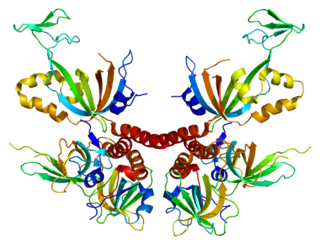| DBF4 | |||||||||||||||||||||||||||||||||||||||||||||||||||
|---|---|---|---|---|---|---|---|---|---|---|---|---|---|---|---|---|---|---|---|---|---|---|---|---|---|---|---|---|---|---|---|---|---|---|---|---|---|---|---|---|---|---|---|---|---|---|---|---|---|---|---|
| |||||||||||||||||||||||||||||||||||||||||||||||||||
| Identifiers | |||||||||||||||||||||||||||||||||||||||||||||||||||
| Aliases | DBF4 , ASK, CHIF, DBF4A, ZDBF1, DBF4 zinc finger | ||||||||||||||||||||||||||||||||||||||||||||||||||
| External IDs | OMIM: 604281 MGI: 1351328 HomoloGene: 40892 GeneCards: DBF4 | ||||||||||||||||||||||||||||||||||||||||||||||||||
| |||||||||||||||||||||||||||||||||||||||||||||||||||
| |||||||||||||||||||||||||||||||||||||||||||||||||||
| |||||||||||||||||||||||||||||||||||||||||||||||||||
| |||||||||||||||||||||||||||||||||||||||||||||||||||
| Wikidata | |||||||||||||||||||||||||||||||||||||||||||||||||||
| |||||||||||||||||||||||||||||||||||||||||||||||||||
Protein DBF4 homolog A is a protein that is encoded by the DBF4 gene in humans. [5] [6] [7]
| DBF4 | |||||||||||||||||||||||||||||||||||||||||||||||||||
|---|---|---|---|---|---|---|---|---|---|---|---|---|---|---|---|---|---|---|---|---|---|---|---|---|---|---|---|---|---|---|---|---|---|---|---|---|---|---|---|---|---|---|---|---|---|---|---|---|---|---|---|
| |||||||||||||||||||||||||||||||||||||||||||||||||||
| Identifiers | |||||||||||||||||||||||||||||||||||||||||||||||||||
| Aliases | DBF4 , ASK, CHIF, DBF4A, ZDBF1, DBF4 zinc finger | ||||||||||||||||||||||||||||||||||||||||||||||||||
| External IDs | OMIM: 604281 MGI: 1351328 HomoloGene: 40892 GeneCards: DBF4 | ||||||||||||||||||||||||||||||||||||||||||||||||||
| |||||||||||||||||||||||||||||||||||||||||||||||||||
| |||||||||||||||||||||||||||||||||||||||||||||||||||
| |||||||||||||||||||||||||||||||||||||||||||||||||||
| |||||||||||||||||||||||||||||||||||||||||||||||||||
| Wikidata | |||||||||||||||||||||||||||||||||||||||||||||||||||
| |||||||||||||||||||||||||||||||||||||||||||||||||||
Protein DBF4 homolog A is a protein that is encoded by the DBF4 gene in humans. [5] [6] [7]
DBF4 has been shown to interact with:

DNA replication licensing factor MCM6 is a protein that in humans is encoded by the MCM6 gene. MCM6 is one of the highly conserved mini-chromosome maintenance proteins (MCM) that are essential for the initiation of eukaryotic genome replication.

Eukaryotic DNA replication is a conserved mechanism that restricts DNA replication to once per cell cycle. Eukaryotic DNA replication of chromosomal DNA is central for the duplication of a cell and is necessary for the maintenance of the eukaryotic genome.

Replication protein A 70 kDa DNA-binding subunit is a protein that in humans is encoded by the RPA1 gene.

DNA replication licensing factor MCM7 is a protein that in humans is encoded by the MCM7 gene.

DNA replication licensing factor MCM2 is a protein that in humans is encoded by the MCM2 gene.

DNA replication licensing factor MCM3 is a protein that in humans is encoded by the MCM3 gene.

Cell division control protein 6 homolog is a protein that in humans is encoded by the CDC6 gene.

DNA replication licensing factor MCM4 is a protein that in humans is encoded by the MCM4 gene.

Origin recognition complex subunit 2 is a protein that is encoded by the ORC2 (ORC2L) gene in humans.

DNA replication licensing factor MCM5 is a protein that in humans is encoded by the MCM5 gene.

Cell division cycle 7-related protein kinase is an enzyme that in humans is encoded by the CDC7 gene. The Cdc7 kinase is involved in regulation of the cell cycle at the point of chromosomal DNA replication. The gene CDC7 appears to be conserved throughout eukaryotic evolution; this means that most eukaryotic cells have the Cdc7 kinase protein.

Origin recognition complex subunit 4 is a protein that in humans is encoded by the ORC4 (ORC4L) gene.

Origin recognition complex subunit 6 is a protein that in humans is encoded by the ORC6 (ORC6L) gene.

CDC45 is a protein that in humans is encoded by the CDC45L gene.

Origin recognition complex subunit 5 is a protein that in humans is encoded by the ORC5 (ORC5L) gene.

Origin recognition complex subunit 3 is a protein that in humans is encoded by the ORC3 (ORC3L) gene.

Histone chaperone ASF1B is a protein that in humans is encoded by the ASF1B gene.

In cell biology, eukaryotes possess a regulatory system that ensures that DNA replication occurs only once per cell cycle.

Origin recognition complex subunit 1 is a protein that in humans is encoded by the ORC1 gene. It is closely related to CDC6, and both are the same protein in archaea.

Replication protein A 14 kDa subunit is a protein that in humans is encoded by the RPA3 gene.